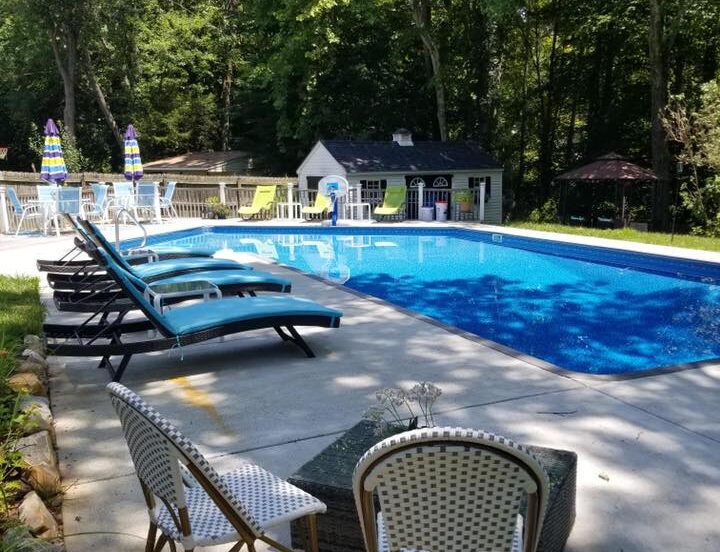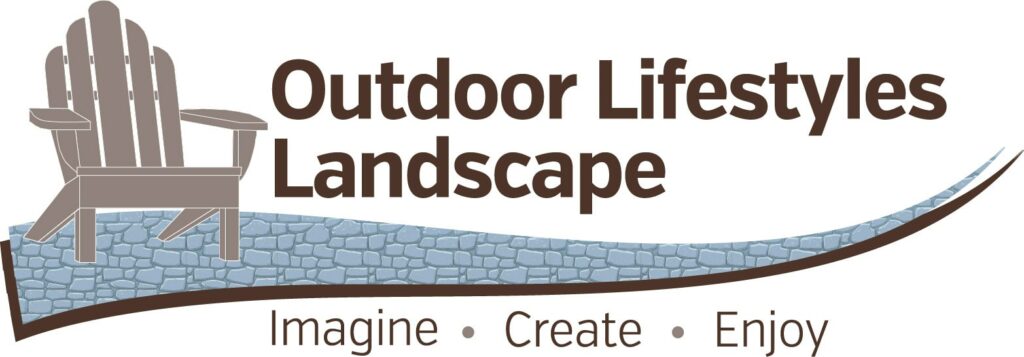Pool Services in Culpeper County
Pool Construction in Culpeper County
Nothing can match the relaxation and satisfaction of a dip in the pool. Yet you can enhance those feelings by hiring Outdoor Lifestyles Landscapes to build one in your backyard! A pool installation behind your Culpeper County house or off your patio is much more affordable than you might think. Nevertheless, doing so requires you to make one crucial choice: the material that will compose it.
Typically, home pools are concrete, fiberglass, vinyl, or stone. Each option has benefits and disadvantages, so you should learn as much about them as possible before choosing.
Let’s break down each of these types so you can determine the best choice for your home.
Concrete Pool Construction in Culpeper County
Concrete is among the sturdiest and most versatile materials available. It works well for backyard pools because it can be customized to virtually any shape or size. Moreover, the durability of concrete pools (given routine maintenance) keeps them in reliable condition for years.
But concrete has its downsides, too. It requires ample time to dry, which extends the installation process. Also, concrete’s rough, porous surface gathers algae and so takes frequent attention to upkeep. Furthermore, its initial build costs run higher than other materials.
Fiberglass Pool Construction in Culpeper County
Fiberglass pools are more cost-effective than concrete ones and come in different designs and shapes. While they like the customizability of concrete pools, fiberglass models’ options ensure you’ll find something suitable. This highly durable material can withstand much wear and tear. Also, it’s smooth and algae-resistant, so you’ll spend less time cleaning and maintaining it than a concrete pool.
The main disadvantages of fiberglass pools are their limits on width (since they come in one piece) and the fact they cost more than materials like vinyl. However, fiberglass’s benefits are compelling enough to make them attractive for many families’ pool installation.
Vinyl Pool Construction in Culpeper County
If you want something affordable and customizable, vinyl is an excellent choice. Since the material is soft and malleable, you can make your pool virtually any shape and wrap the vinyl around the interior. Vinyl is also algae and weather-resistant, though not as much as fiberglass.
The main disadvantage of vinyl pool liners is that they only last a few years before requiring replacement. Moreover, installation problems may reduce the liner’s lifespan to 1 or 2 years—an expensive headache. However, the availability of colors and designs—and the sizing options—gives you virtually no limits to what you can do with vinyl.
Stone / Tile Pool Construction in Culpeper County
With a proper budget and desire for a luxurious and refined-looking pool, you can’t go wrong with stone tiles. The pool’s appearance is incredible, and it will give you a sense of awe every time you go swimming. Plus, the tiles can have smooth surfaces for walking and swimming, and you can get a custom pool installation with as many colors and designs as you like.
The upfront cost of a tile pool is high due to the labor-intensive installation process. Plus, tiles can fall off over time, especially if your pool chemicals are out of balance. This kind of pool’s aesthetic and customization make it a worthy investment for many people, but they must be ready for installation and upkeep.
Pools & Water Features in Culpeper County
We create stunning water features, including ponds, waterfalls, pond-less waterfalls, fountains, and custom in-ground swimming pools and spas for Culpeper County Residents.
Call Now for Pool Construction in the Culpeper County Area!
Are you ready to upgrade your backyard with a stunning pool? If so, give us a call! We can come out, provide an estimate, and discuss material options so you’re satisfied with the results. No matter what kind of pool you want, Outdoor Lifestyles Landscapes can make it happen.

Schedule a Consultation
During our initial on-site consultation, we listen to your needs and vision. Then, we assess your landscape with advanced 3-d models and phase rendering. Doing so allows us to present you with an accurate estimate for your project.
